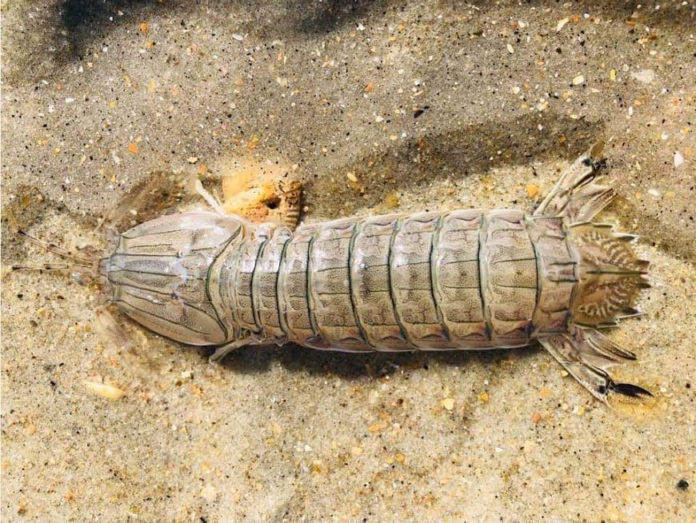The mantis shrimp is one tough customer. Beautiful and deadly are two words you don’t typically use to describe shrimp, but the mantis shrimp is definitely in a class of its own; earning a reputation as the ‘savage boxer of the sea’ and one of the most fearsome creatures in the ocean.
Despite their name, mantis shrimp aren’t shrimp at all. They are distant relatives to crabs, shrimp, and lobsters. But, big things sometimes come in small packages, don’t they?
Seen often in local waters here in the Southestern U.S., the mantis shrimp is usually found in shallow tropical or subtropical waters, with some species occasionally found in sub-Antarctic waters. They are found along shores usually living in a burrow to move in and out to capture prey when spotted. They can also live in coral reefs or rock crevices and are often seen in tide pools along the beach.
The mantis shrimp uses two appendages called dactyl clubs to pummel its prey. Their wrecking ball “fists” spring forth from their bodies at around 50 mph, accelerating quicker than a .22-caliber bullet. At those speeds, the water surrounding them briefly reaches the temperature of the Sun’s surface. When the clubs hit their target, they deliver 160 pounds of force, smashing through shells like a lightning-fast hammer.
It only takes a split second for their clubs to hit their hard-bodied prey, such as snails and crabs, and to crack tough shells open like they were eggs.
If you see one, you’d better watch out. These thumb-splitters can cut through a person’s finger in milliseconds, and usually do.
Mantis shrimp come in a variety of species, and we’re aware of about 550 of them, many of which are of a tremendously bright, beautiful color. Stomatopods (their scientific name) from different species range in size from smaller than an inch to longer than a foot. They also have the most complex set of eyes in the entire animal kingdom. Each eye contains 12 photoreceptors that allow them to sense different types of color. Scientists believe that mantis shrimp take all the visual information they see into their brains at once without processing it, allowing them to react to their surroundings as quickly as possible. Their independently roaming eyes and vision also make them excellent hunters.
In fact, their biology is so bizarre that scientists have given them the nickname, shrimp from Mars.
They can’t be kept in captivity and it’s rare to see one at an aquarium because they’re just too destructive. The same clubs that allow them to shatter shellfish are also capable of cracking a glass tank.
Can you eat them?
Some say yes, some say no. They’re said to not be easy to eat but its meat is said to be quite rewarding. Mantis shrimp are fascinating creatures. They’re also delicious, with sweet, tender meat that, unfortunately, isn’t easy to extract from the shell.
At the few seafood restaurants where you might find them served, the chef will usually split open the shell along the belly, or cut them into pieces, which makes it easier to get the meat out.










